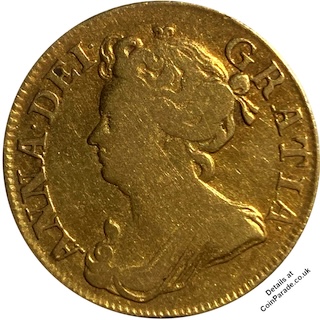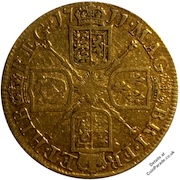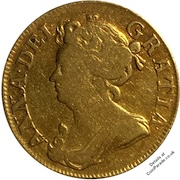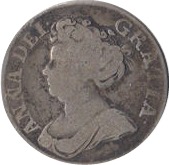
 1711 Queen Anne Guinea
1711 Queen Anne GuineaThis 1711 Gold Guinea shows the third draped bust of Queen Anne. Minted in the post-union period with Scotland. SCBC 3574. The Third bust only differs slightly from the Second bust, with modifications to the eye and facial expression.
Queen Anne guineas tend to be expensive, starting prices are just below £1,000 in Fine condition, but quickly rising over £10,0000 in EF even for common dates.
The Reverse shows a crowned cruciform coats-of-arms with sceptres in the quarters. Date at top.
 Obverse shows the portrait of Queen Anne. Legend is "ANNA DEI GRATIA" (Anne by the grace of God).
Obverse shows the portrait of Queen Anne. Legend is "ANNA DEI GRATIA" (Anne by the grace of God).Image credit: M J Hughes Coins
Mintage: Not known
Minted at The Royal Mint
Below are some coins currently being offered on eBay. As an eBay Partner, We may be compensated if you make a purchase.
 Anne became Queen of England, Scotland and Ireland on 8 March 1702. On 1 May 1707, under the Acts of Union, two of her realms, the kingdoms of England and Scotland, united as a single sovereign state known as Great Britain. Some of these post-Union coins have an 'E' below the bust for Edinbugh Mint.
Anne became Queen of England, Scotland and Ireland on 8 March 1702. On 1 May 1707, under the Acts of Union, two of her realms, the kingdoms of England and Scotland, united as a single sovereign state known as Great Britain. Some of these post-Union coins have an 'E' below the bust for Edinbugh Mint.Born Anne Stuart, the daughter of James II, she became Queen after the death of William III. Anne was the last of the Stuarts and became the first monarch of the newly formed United Kingdom of Great Britain.
Some coins have "VIGO" on them, meaning they were minted from bullion captured from the Spanish fleet at Vigo Bay. They can be quite rare and expensive.
The regnal years for Queen Anne coins were:
1703:SECVNDO; 1705:QVARTO; 1706:QVINTO; 1709:OCTAVO; 1711:DECIMO; 1713:DVODECIMO; 1714:DECIMO TERTIO.
The Guinea is a famous British gold coin minted between 1663 and 1814. The coin was originally created as a one pound coin (20 shillings) but is better known as being worth One Pound and One Shilling (21 shillings).
After the English Civil War, King Charles II introduced new coinage. A gold coin, approximately a quarter of an ounce, was issued and for the first time it was not hammered. Made by machine using gold from the Guinea Coast of West Africa the coin probably became the most important coin of the realm.
Originally 20 shillings, the coin actually fluctuated with the gold price, at times being as high as 30 shillings. In 1717 the Guinea became fixed at 21 shillings (in today’s money that is £1.05). Other coins of the family were also minted, such as half-guinea, two-guinea and five-guinea.
The design of gold guinea changed dramatically over the years, from depictions of crowned cruciform shields to the ‘Spade’ shaped crowned shields of arms.
In the Great Recoinage of 1816 the Guinea was replaced by the Pound and the Sovereign became the gold coin in use. The last guinea was issued during the reign of King George III in 1813. That particular coin is known as a ‘Military’ guinea, as it was specially struck to pay British troops at the time of the Napoleonic Wars.
Long after the Guinea was retired the name continued to be used, especially for prestige purchases intended for the more wealthy. Even now racehorses are still sold in Guineas (the auctioneer traditionally taking the 5p as commission).
Guineas are 25mm in diameter, weigh about 8.38g and are 22 carat gold (91.6%). Prior to 1717 they weighed slightly less (around 8.3g) and were made of 91.34% gold.
Millions of gold guineas were minted and widely circulated, so often turn up in fine to very fine condition. As with all coin types, some years are much rarer than others, such as the 1761 guinea (as it was the first guinea minted during the reign of King George III).
Formed in the reign of Alfred the Great about the year 886, during the period 1279-1812 it was generally referred to as The Tower Mint as it was housed at the Tower of London. The Master of The Royal Mint has included famous figures such as Sir Isaac Newton.
Since 2010 it has operated as Royal Mint Ltd, a company owned by HM Treasury, under an exclusive contract to supply all coinage for the UK although it also produces medals and coins for other countries. It is currently located at Llantrisant, Wales.
The orignal coinage was Pounds, Shillings and Pence but since decimalisation on 15 February 1971, it is £1 = 100p, that is One Pound = 100 pence. The coinage of the UK is also a long history, the Royal Mint being established as long ago as 886AD when coins were hammered. Today there is perhaps 30 billion coins in circulation, and many (numismatic) collectors coins and sets are issued frequently in gold, silver and other metals.








